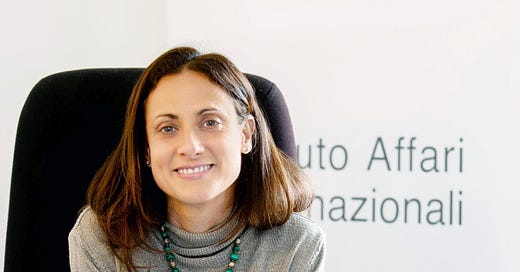In Conversation With Nathalie Tocci
A conversation on climate policy with Nathalia Tocci, Director of the Instituto Affari Internazionali
Nathalie Tocci is Director of the Instituto Affari Internazionali. She has been Special Advisor to EU High Representatives Federica Mogherini and Josep Borell, and has published extensively on EU foreign policy, integration and conflict resolution.
We had the chance to talk to Nathalie Tocci about her latest book, A Green and Global Europe, in which she argues that the EU’s energy transition can only succeed if the bloc adopts a truly global approach — one that addresses the adverse effects and global cleavages that may arise as a result of its green agenda. You can purchase her book using this link.
The EU often prides itself on being a leader in the field of climate policy. Until now, do you think the bloc has been living up to expectations?
Yes…and no. The EU has led the way on climate ambition, both by consistently ramping up its climate objectives, and by encouraging the rest of the world to move in the same direction, as evidenced by its active climate diplomacy in the context of the successive Conferences of the Parties. However, the EU has lagged behind not only in terms of implementation internally, but also by failing to provide sufficient incentives for other countries to follow suit. Indeed, there is a risk of a decoupling of green and brown economies, to the detriment of both and of the planet as a whole.
What is the “green and global” Europe you describe in your book? Is it a Europe you wish for, or one that already exists?
A green Europe is certainly in the making. Especially during the current political-institutional mandate, the EU has elevated the green agenda — the European Green Deal — to the core of its identity. It has used effectively the two existential crises it has faced — the pandemic and Russia’s invasion of Ukraine — to accelerate and double down, rather than set aside, its green agenda. This is good news. The bad news is that the EU’s global role lags woefully behind. And precisely because there cannot be a green Europe in a brown world, the argument of my book is that a green and global Europe can only be understood as two sides of the same coin.
You advocate for the development of an EU foreign climate policy. Explicitly linking climate policy and foreign policy seems rather unusual. Was it always an obvious association to you?
The logic I followed is that if one accepts the premise that a green Europe is and should be the EU’s new narrative, and that it can only be realized if the rest of the world moves in the same direction, then climate and the transition must be put at the centre of our foreign policies, rather than be considered appendices to them. We are now used to thinking about the nexus tying together climate, energy, security, development, migration, food and much more. However, if a green Europe is to become the new Europe, it is climate and the transition that must lie at the centre of the nexus.
Why do you believe a foreign climate policy is crucial for the EU to succeed in its energy transition? What would this policy look like in practice?
Given that the transition really amounts to a revolution in terms of magnitude and speed at which it must take place, like all revolutions there will be winners and losers. Unless those losers are identified, and those negative social, economic, political or geopolitical consequences catered for, the transition will either not take place within the set time frame or generate consequences that will come biting back at the EU. Addressing these consequences requires unpacking first what they might be, both in internally, in our neighbourhood and globally, in order to then tailor all our external tools and policies to mitigate or compensate negative consequences while enhancing positive ones.
What are, if any, the institutional changes required for the EU to develop a coherent foreign climate policy?
Putting climate and the transition at the core of our institutions. Some member states like Germany are beginning to do so, while others lag well behind. The European external action service has five people working on these topics. This is more than was the case a few years ago but still woefully inadequate.
After China, the US is on a path to boost its green industry with the Inflation Reduction Act. Can the EU stay global — especially on trade — if it wants a realistic shot at turning green?
The EU and the US really need to sort this problem out. The EU is approaching the transition through carbon pricing and the carbon border adjustment mechanism as key policy instruments. The US by subsidizing green industry. In principle both methods work by creating a price differential between green and brown products and services. The problem lies when the two sides of the pond opt for diametrically opposite approaches, with the risk being the deindustrialization of Europe.
Is there a possibility the EU could fail its energy transition because of external factors? What are the risks here?
Yes, the transatlantic dimension is key here, as is the relationship with China. As competition with China increases, where does this leave the transition? There is a real risk that we will address climate and the energy transition not as a global commons problem requiring multilateral cooperation, but as the key dimension — alongside technology — of the West’s competition with China, to the detriment of all.
This interview was conducted by Augustin Bourleaud.



